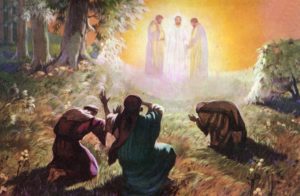[Greek] φοβέομαι (phobeomai), [Latin] timere, [Latin] verere: be afraid, be alarmed, be scared, be frightened, be apprehensive, be filled with dread, be anxious, to panic, to revere, to respect; 110 scriptural references

The Transfiguration: painting by William Hole
Background Information:
Ancient Greece: The idea of fear took on an amorphous quality as real as a powerful deity. Fear was personified being depicted as a typical war god. Sacrifices were made to appease this god. One’s reaction of fear was closely bound with the understanding of one’s own existence. Fear was depicted in various forms in the Greek tragedy. The different Greek philosophical schools held various opinions on the idea of fear. This term can mean to put to flight, to be alarmed at something, to fear to do something, to stand in awe, to dread, and to terrify.
Aeschines’ Against Timarchus 1.43 states “The foreigners were so scared that they dropped everything and ran away as fast as they could go.” Euripides’ Rhesus 37 states “Your tidings now inspire fear.” Sophocles’ Trachiniae 671 states “My friends, I am afraid I have gone too far in everything I have just done.” Xenophon’s Anabasis 1.3.17 states “And I shall be afraid I have gone to far in everything I have just done, for fear of his leading us to a place from which it will not be possible to escape.” Aeschylus’ Suppliant Women 893 states “I do not fear the native gods, be assured.” Sophcles’ Ajax 227 states “I shudder at the future’s advancing step.”
Old Testament: The subject of fear in the Old Testament is almost always about man, depending on the circumstances and nature of that fear. Fear played a considerable role in the consciousness of the Israelites. On the other hand, one finds freedom from fear as a result of confidently turning to God who helps and protects them from fear. The term “God-fearing” denotes those whose conduct is oriented to the will of God. This freedom is promised as an eschatological blessing. The expression “Fear not!” is a common Old Testament phrase of reassurance and assistance in everyday life.
New Testament: The uses of fear are predominately found in traditional situations. Only a few times does it represent specific concerns of primitive Christianity. The widespread theme of fear of God’s epiphany is presented in the accounts, deeds, and destiny of Jesus. Luke continues the Old Testament “god-fearing” motif with the Gentiles who became Christians. This is the Christian starting point of the Gentile mission. Some new Christian converts may have faced the fears and insecurities of falling back into their former Jewish or pagan practices.
Since there are over 110 scriptures, I am afraid I can’t discuss each one. I will include some important points (examples):
“Do not be afraid”, “Be not afraid”, ‘Fear not”, “Have no fear”: This phrase (and it’s variations) is most repeated phrase in the bible (Old Testament and New Testament)
Jesus states one must be afraid of God, the law-giver.
The Latin for “Do not be afraid” is “Noli timere.”
If you do evil, be afraid.
Marriage: Husbands and wives each have a sub-mission to love, serve and respect each other.
Even the demons feared Jesus.
Conclusion:
Phobia, timid, venerate, veneration
In the Greek Hellenistic era, it was interesting to discover the various meanings of this term which can applicable in any time period. Fear is a deeply ingrained aspect of human nature. Sophocles provides a more nuanced meaning about regretting what one has done. Xenophon and Sophocles both speak of fear (dread) of what the future will bring. The Homer sagas speak of panic flight.
In the Old Testament, fear becomes a great positive (and negative) motivator in having a right relationship with God. Starting in the Old Testament, dreams (and encounters with angels) provides the means in how God communicates with man.
The psychological sense of phobias (fear, panic, terror, etc.) begin to appear around 1790-1895. From this comes the many conditions (symptoms) ending with -phobia.
Arizona: Many people have said that this past election was ‘the most secured election ever’. Then why has there been so much opposition (and pushback) against having a full forensic examination of the ballots? Arizona politicians (both Democratic and Republican) have blocked and stonewalled this process against the citizens’ wishes. Why are they doing this? What are they afraid of? (if this was the most secured election ever). One wonders if they are afraid of what this forensic examination will show.
Many of us continue to have serious concerns and fears about the integrity of our elections. We are already becoming fearful of the speech restrictions, assembly restrictions, censorship, disastrous policy decisions, legislative pork spending, and redefining our institutions (judicial branch, border, etc.) coming our way. You know it is terrible policy when you cannot even get the support of Republicans.
Multi timent patriae (Many of us are afraid for our country!)
